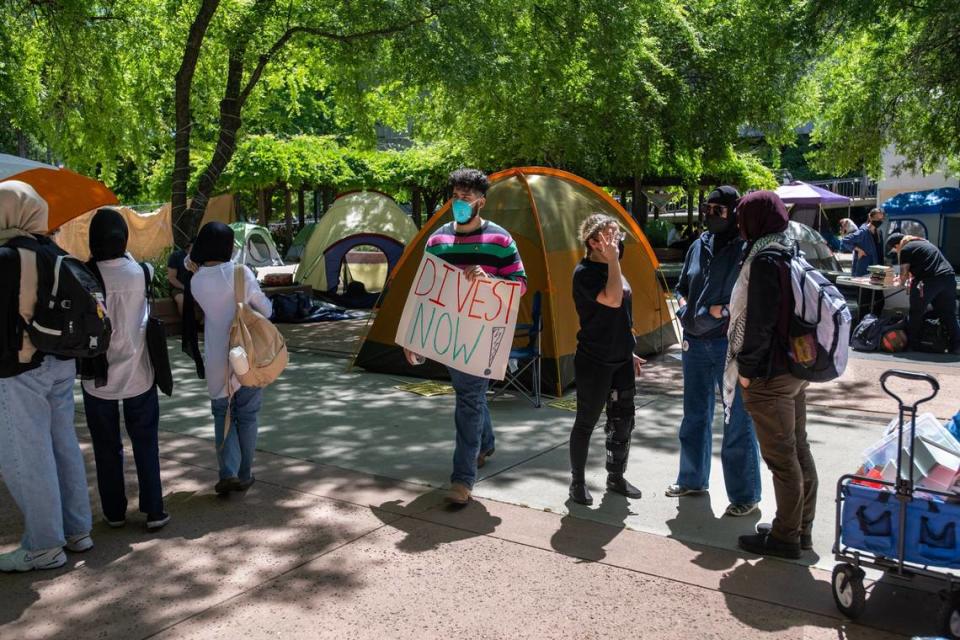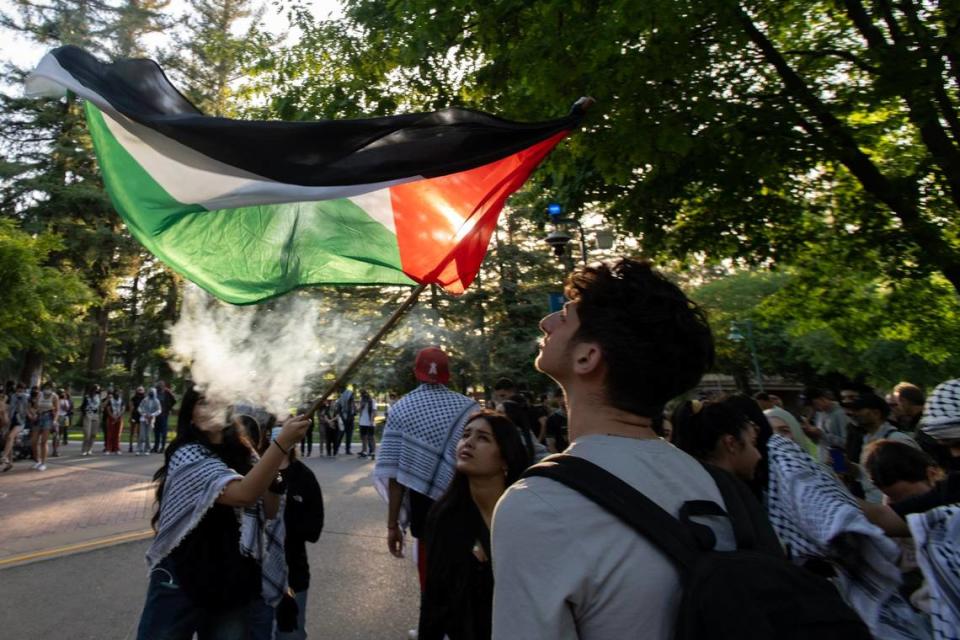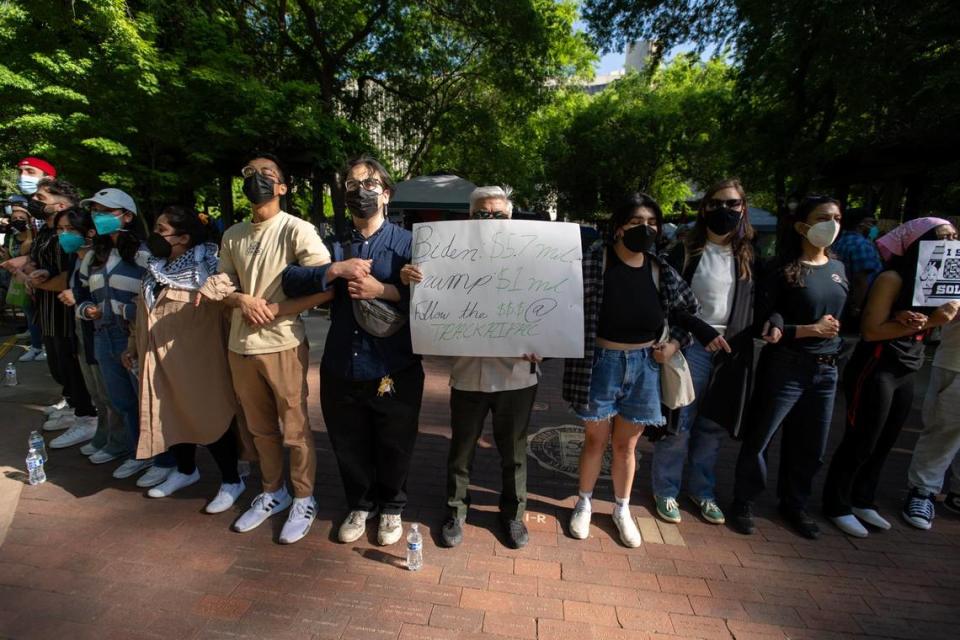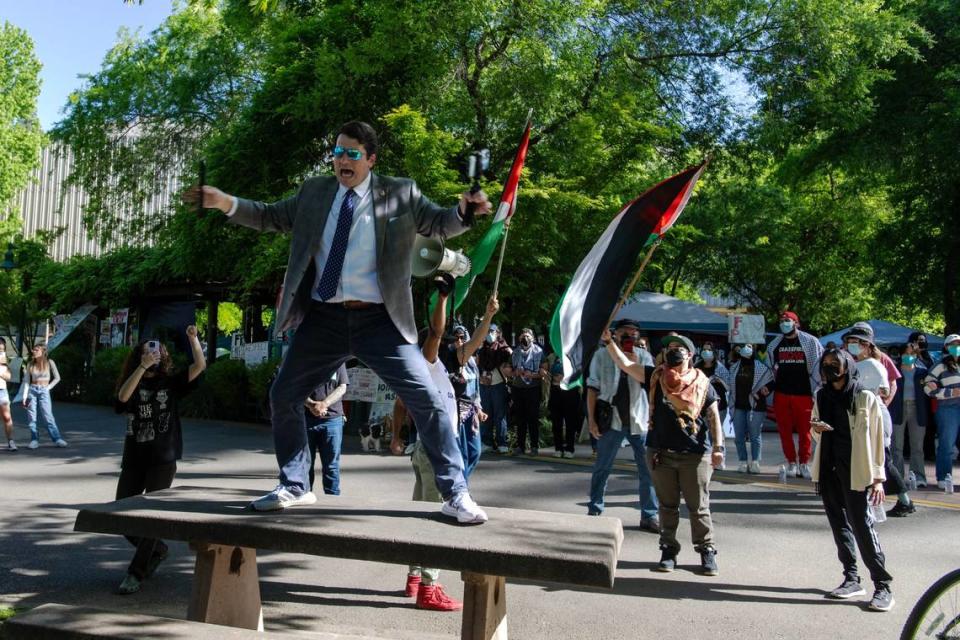What can protesters legally do on California campuses? Is ‘civil disobedience’ OK?
While the First Amendment protects your right to protest, there are limitations when it comes to exercising this right on California university campuses.
The amendment reads: “Congress shall make no law respecting an establishment of religion, or prohibiting the free exercise thereof; or abridging the freedom of speech, or of the press; or the right of the people peaceably to assemble.”

Chessie Thacher, a senior staff attorney at the American Civil Liberties Union of Northern California, said your right to protest isn’t typically limited on university grounds.
“It depends,” she said in a phone interview with The Sacramento Bee on Thursday afternoon. “California’s universities are typically viewed as public or limited public forums where the public can be invited.”
Across California, students at an estimated 27 colleges — both public and private — have staged pro-Palestinian protests in recent weeks, calling for a ceasefire in Gaza and institutional divestment in Israel.
When protesting on campus property, here’s what you need to know about protest rights and effective strategies, according to California experts:
What are your rights while protesting?
According to the ACLU of Northern California, the First Amendment protects the right to organize a protest, express your opinion and photograph events while on public property.
What are my rights on university grounds?
Leonard Law, or Education Code 94367, says all private and public educational postsecondary institutions, not controlled by a religious organization, are prohibited from enforcing rules or disciplining students for protected speech under the First Amendment.

“The First Amendment and the California Constitution protects your right to expressive speech,” Thacher said. “That means that you have the right to say what you want to say, but with exceptions.”
On university property, campus officials can legally regulate reasonable time, place and manner of gatherings. This includes implementing rules to prevent crime and maintain the safety of people or property. It also includes restrictions to avoid disruption of university functions, according to the CSU Handbook of Free Speech Issues.
For example, “(universities) can say protesters cannot use a megaphone at 2 a.m. on campus property,” Thacher said.
“All CSUs have ... protocols on practicing free speech activities on campuses,” the California State University Office of the Chancellor wrote in an email statement.
While the CSU operates as a system, consisting of 23 universities, each campus has its own set of circumstances and local jurisdictions, the office said.
“As such, campuses will make real-time decisions (through) a local lens and appropriate to the situation,” the CSU office wrote.
California universities, whether public or private, cannot prevent students from protesting entirely.
“They have to give students some space to express themselves,” Thacher said. “Students should know that the First Amendment applies, but it is not an absolute. There are restrictions.”
Decisions regarding protest restrictions at universities are determined by campus officials.
These rules tend to target “disruptive conduct,” such as committing acts of violence or occupying campus buildings.

When can police interfere with protests?
When protesters fail to comply with university policies or legal restrictions, such as evoking violence, law enforcement can intervene, the ACLU website says.
In the event that students are disrupting the regular operations of a university or protesting on a non-public forum, such as an administrative building, Thacher said university officials can rely on law enforcement.
Though occupying a non-public forum can be considered civil disobedience, she said it “goes beyond expressive activity and you’re in a different realm from what’s protected under the First Amendment.”
“Civil disobedience is a public, nonviolent, conscientious yet political act contrary to law, usually aimed at bringing about a change of the law or government policy,” as defined by the United States Department of Justice.
However, “civil disobedience is not protected speech under the Constitution,” according to the University of California, Los Angeles Police Department.
An act of civil disobedience includes occupying a campus building without permission, Thacher said. Civil disobedience also includes sitting on a public road to block traffic. It can be a successful tool in non-violent action, experts say.

How can I successfully protest?
Margaret Russell, a professor at the Santa Clara University of Law who specializes in civil human rights, said peaceful and non-violent approaches to protesting can prove successful.
“Peaceful protests with clearly stated messages and disciplined expression are often the most effective,” Russell wrote in an email to The Bee on Thursday afternoon. “They convey their points of view without threat harassment, or enmity.”
Some examples of successful protests that have proved to be effective in pushing change include chanting, marching, carrying signs, singing, silence, linking arms or holding hands with allies, Russell said.

“It is counterproductive to engage in any acts of violence, harassment, ridicule or hate,” she said.
To enact change, Russell said “peaceful protest and civil disobedience are two valuable tools” for protesters.
“So are ways of ‘working through the system’ such as running for office, serving on committees, engaging in respectful dialogue, and trying to talk across differences,” she wrote.
When individuals begin to engage in non-peaceful protesting acts, Thacher said the law does not protect them.
“That’s not a productive way to move forward,” she said.
What do you want to know about life in Sacramento? Ask our service journalism team your top-of-mind questions in the module below or email servicejournalists@sacbee.com.


